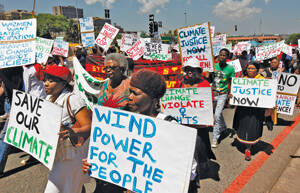Pope Benedict XVI urged international leaders to reach a credible agreement on climate change following the Angelus blessing at the Vatican on Nov. 27. Officials from 194 countries began meeting the following day in Durban, South Africa, to discuss the next steps in reducing greenhouse gases and stopping global temperatures from rising.
“I hope that all members of the international community can agree on a responsible, credible and supportive response to this worrisome and complex phenomenon, keeping in mind the needs of the poorest populations and of future generations,” the pope said.
Such a conclusion could not come at a more crucial time. The world is getting warmer, and increasing temperatures are expected to amplify floods, droughts and other extreme weather patterns around the planet. That is the conclusion of a U.N. report released on Nov. 29 to accompany the Durban Conference. According to the U.N. World Meteorological Organi-zation, the warmest 13 years, based on average global temperatures, have all occurred in the 15 years since 1997.
“I think we are seeing the effects of a change in climate,” said Tim Aldred, head of policy and communication at Progressio, a U.K.-based Catholic development agency. He added, “I think, certainly for the poorest communities around the world, that there is a lot of clarity that the climate is changing, [that] it’s changing for the worse and that action is required and that it’s a matter of justice.” Aldred said that he was encouraged to see Pope Benedict regularly speaking about climate change.
Cardinal Oscar Rodríguez Maradiaga of Honduras, president of Caritas Internationalis, led a 20-person delegation from Caritas to the Durban talks to press for an agreement on behalf of poor countries that have suffered the most from weather- related crises. “Our climate is changing,” he said. “Caritas organizations are responding to increasing unpredictability and extreme weather conditions experienced around the world. This year we saw floods in Central America, South and Southeast Asia and drought across East Africa,” said Cardinal Rodríguez in a statement released by Caritas.
“Urgent action is necessary,” the cardinal said, calling on negotiators in Durban to cease delaying “international legislation to curb the threat of climate change and set the world on a path to a more just and sustainable future.”
The Durban meeting, which runs until Dec. 9, is the latest climate conference considering follow-up action to the 1997 Kyoto Protocol. The Durban encounter is considered crucial in forging additional international commitments on reducing carbon emissions. The goal of the Durban talks, organized by the U.N. Framework Convention on Climate Change, is to cut greenhouse gases by 50 percent by 2050 and prevent temperatures from rising more than 2 degrees Celsius. The expiring Kyoto accords, Cardinal Rodríguez said, “must not die here in South Africa.”
In 2011 East Africa suffered the worst drought in half a century. According to Caritas, drought conditions are not new in East Africa, but changes in weather patterns combined with lack of investment and competition for land and water have eroded the capacity of local people to cope with extreme conditions.
“The whole world is vulnerable to climate change, but poor countries are affected more,” Cardinal Rodríguez said. “Africa is one of the most vulnerable continents to the impacts of climate change. Africans are taking a stand in Durban; it is time for the world to stand with Africa.”








